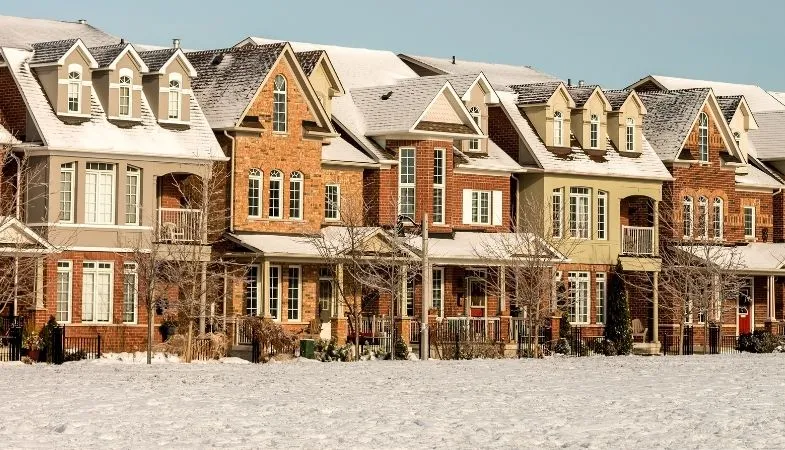
Are the Bank of Canada’s (BoC) interest rate hikes influencing the GTA real estate market?
There have certainly been some developments in the last year. On the one hand, demand has declined alongside prices. On the other, the average selling price remains above pre-pandemic levels. These developments were seen in the latest Toronto Regional Real Estate Board (TRREB) update for January.
According to TRREB data, residential property sales were down at an annualized rate of 44.6 per cent in January, totalling 3,100 units. The MLS® Home Price Index Composite Benchmark, considered a more accurate and comprehensive measurement of prices, was in line with December 2022, but fell 14.2 per cent year-over-year, to $1,038,668.
Here is a breakdown of how the GTA housing market performed by home type:
Detached
- Residential Sales: –6 per cent to 1,384 units
- Average Price: -23.0 per cent to $1,341,848
Semi-Detached
- Residential Sales: -45.5 per cent to 240 units
- Average Price: -22.3 per cent to $1,019,668
Townhome
- Residential Sales: -43.5 per cent to 499 units
- Average Price: -18.0 per cent to $887,610
Condo
- Residential Sales: -52.7 per cent to 950 units
- Average Price: -8.1 per cent to $687,696
Industry experts contend that rising borrowing costs have had a short-term shock to the GTA real estate market, but change could be on the horizon.
“Home sales and selling prices appear to have found some support in recent months. This coupled with the Bank of Canada announcement that interest rate hikes are likely on hold for the foreseeable future will prompt some buyers to move off the sidelines in the coming months. Record population growth and tight labour market conditions will continue to support housing demand moving forward,” said Toronto Regional Real Estate Board (TRREB) President Paul Baron.
New residential listings tumbled 3.7 per cent from the previous year, with 7,699 units. Active residential listings spiked 124.6 per cent, totalling 9,299 units, real estate association numbers confirmed in January 2023.
Here is a look at how some of the other large GTA housing markets performed to kick off the year:
Mississauga (Peel Region)
- Residential Sales: 262 units
- Average Price: $920,587
- New Listings: 634 units
- Active Listings: 747 units
Markham (York Region)
- Residential Sales: 146 units
- Average Price: $1,265,937
- New Listings: 290 units
- Active Listings: 309 units
Oakville (Halton Region)
- Residential Sales: 122 units
- Average Price: $1,361,445
- New Listings: 281 units
- Active Listings: 358 units
Orangeville (Simcoe County)
- Residential Sales: 21 units
- Average Price: $830,577
- New Listings: 36 units
- Active Listings: 42 units
Oshawa (Durham Region)
- Residential Sales: 111 units
- Average Price: $775,233
- New Listings: 248 units
- Active Listings: 230 units
What Will the GTA Housing Market Look Like in 2023?
Whether you call it a correction or a downturn, the numbers prove that 2022 fell short of the meteoric pandemic-era gains of 2020 and 2021 in the GTA housing market and the broader Canadian real estate industry.
Will 2023 be more of the same, or will market conditions experience a turnaround?
Surprisingly, heading into 2023, the GTA real estate sector slipped into balanced territory. As they were in 2022, rising interest rates will play an important factor in the GTA, says Cameron Forbes, RE/MAX Realtron Realty broker, in the RE/MAX 2023 Canadian Housing Market Outlook Report. But it will not only be the central bank’s rate hikes that will influence the housing market.
“We’re seeing three main trends that will continue into next year,” Forbes said. “Continued interest rate increases and associated price adjustments, rising unemployment due to an economic slowdown, and new opportunities to engage in the market for buyers and sellers because of improved affordability. For buyers, this includes having fewer competitors, reduced prices and an increase in choices in the market. Meanwhile, sellers will have a trade-up advantage, reduced competition of listings, a stronger ability to re-locate to the suburbs, and have all of the advantages that buyers do, too.”
Here is a look at where some of the GTA housing markets could be heading over the next 12 months:
GTA
- Sales Price Estimate: -11.8 per cent
- Unit Sales Estimate: – 11.4 per cent
Durham
- Sales Price Estimate: -10 per cent
- Unit Sales Estimate: -10 per cent
Mississauga
- Sales Price Estimate: +5 per cent
- Unit Sales Estimate: +12.5 per cent
Oakville
- Sales Price Estimate: +2 per cent
- Unit Sales Estimate: -5 per cent
York
- Sales Price Estimate: +5.5 per cent
- Unit Sales Estimate: +15 per cent
Other experts contend that weakness in the real estate market should extend into the first or second quarter of 2023 and then potentially rebound later in the year and heading into 2024 when higher interest rates have peaked and are baked into the marketplace.
Economists at TD Economics anticipate that home sales in the Ontario real estate market will fall 15.5 per cent in 2023 and then surge 24.4 per cent in 2024. Home prices are projected to slump more than 11 per cent in 2023 and rebound by 1.7 per cent in 2024.
“Ontario has also been at the centre of Canada’s housing market correction, with the province recording some of the steepest home prices declines of any market in the country. Prices should be pressured down further over the next few months as the impact of rate hikes pushes home sales to lows not consistently seen since the early 2000s,” wrote TD Chief Economist Beata Caranci.
According to RBC Economics, home sales are forecast to slide 10.4 per cent in 2023, while home prices are projected to slide nearly 10 per cent.